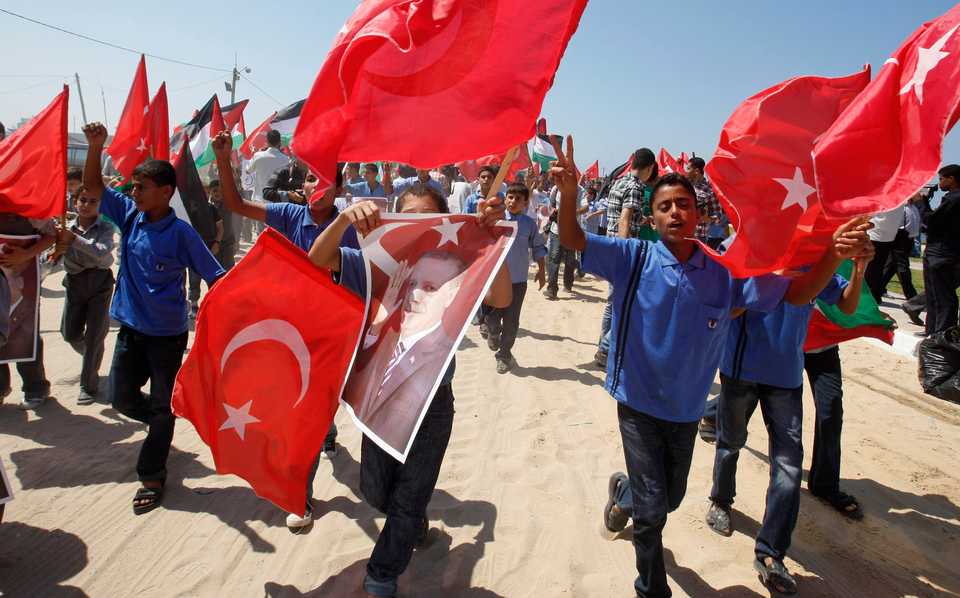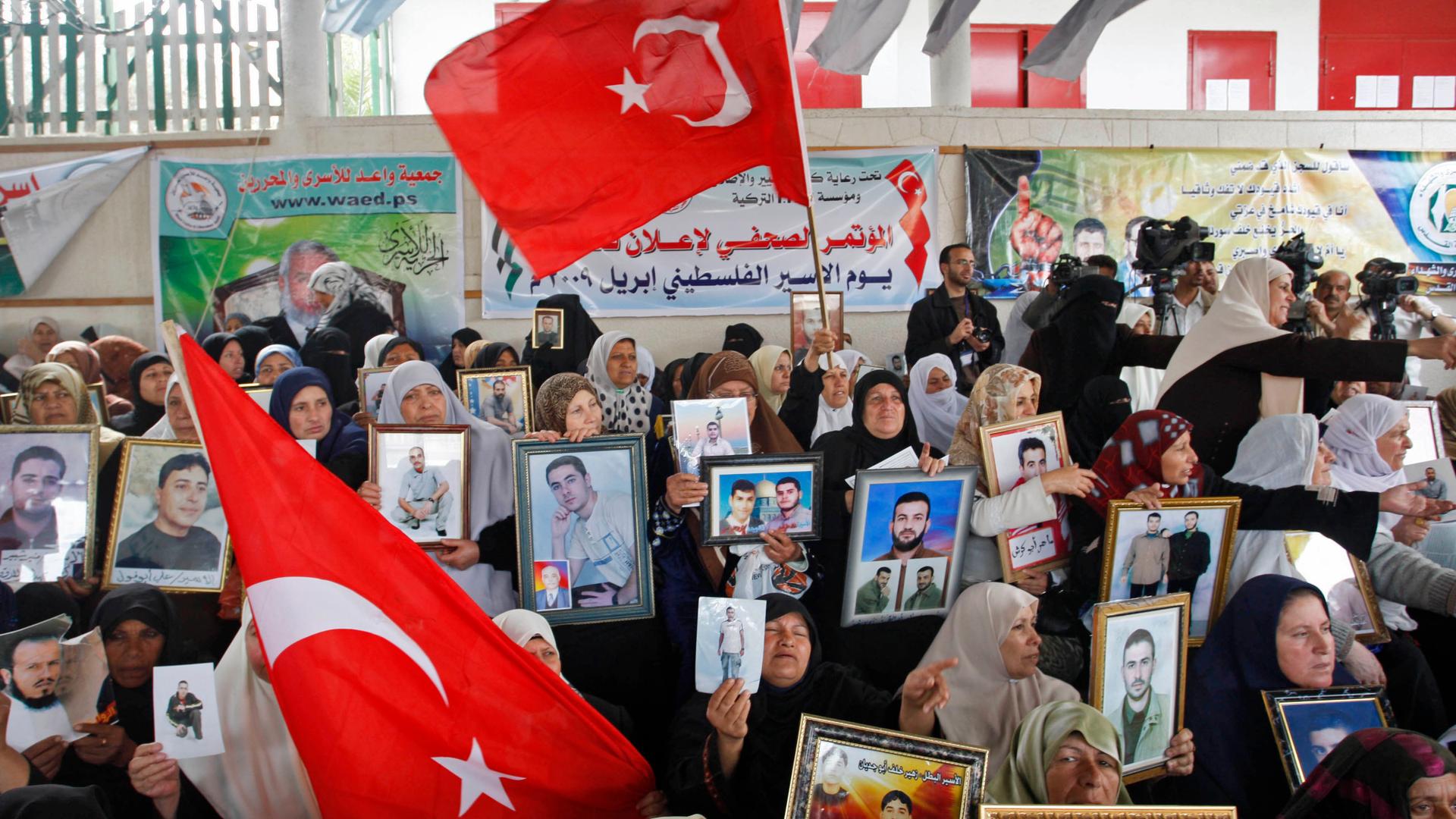While some Arab countries in the Gulf, as well as Egypt, are at odds with Turkey pushing the Arab League to issue occasional condemnations of Turkish foreign policy, the Arab public appears to embrace Ankara’s political stances, according to a newly released Arab Opinion Index.
Nearly 60 percent of Arab respondents to the survey have indicated that they approve the way Turkey conducts its foreign policy in the Middle East from Libya to Syria and Palestine.
Turkey’s foreign policy is perceived with greater approval than many powerful countries including the US, Russia, China, Germany, France and Iran, the poll reveals.
Despite the perpetual criticism of Turkish foreign policy from some Arab countries, which have long been led by autocrats as in the case of Egypt, Syria, Saudi Arabia and the UAE, respondents to the poll show they disagree with their leadership.
Even in the most contentious territories like Syria and Libya, Turkey’s foreign policy has received more approval from the Arab respondents than all other countries included in the survey.
Turkey’s Syria policy received 38 percent approval, while all other countries’ ratings were at less than 25 percent, according to the poll.
Turkey’s Libya policy also did better than other countries, receiving 31 percent, while all others, including the US, Russia, Iran and France, were again at less than 25 percent.
Ankara’s Palestine stance has also received strong support from the Arab public, the poll shows, as its numbers almost doubled in comparison to most other countries’ approval ratings regarding the Israeli occupation.

Some Arab analysts see Turkey’s conservative AK Party, and its leader President Recep Tayyip Erdogan, as the main reason behind the current Arab public approval of the country’s foreign policy.
“Arabs differentiate between Turkey pre-Erdogan and Turkey under Erdogan. It is important to assert that Arab public opinion sees Erdogan as the centre and catalyst of Turkish foreign policy, not the traditional Turkish ‘state’,” says Sami Hamdi, an Arab political analyst and head of the International Interest, a political risk group,
“Turkey pre-Erdogan is considered a foreign and repressive entity disconnected from the Arabs. Under the AK Party, Turkey is seen as a resurgent Muslim power bringing about a long-awaited challenge to the regional status quo underpinned by US military power and regimes who survive through a policy of appeasing Washington,” Hamdi tells TRT World.
Unlike many Arab autocrats enabled by the US, Erdogan has been elected through free elections and that has also played a crucial role for why the Arab public has gradually shifted positively toward Turkey, according to Sami al Arian, a prominent Palestinian-American professor.
“The large percentage of Arab people look at Turkey as an example in which they wish their government had this kind of governance. In other words, they look at the Turkish democracy, the fact that people go to the polls and the fact that you have the multi-party system and the fact that you are able to express your opinion…,” Arian tells TRT World.
“Turkey is considered one of the most participatory nations on earth. You have a participation rate over 80, which is unprecedented in many parts of the earth,” Arian says.

Arab anger directed at the US
The opinion poll also shows there is a strong displeasure toward US foreign policy across the Middle East. Nearly 90 percent of the respondents have negative views toward Washington’s policies across Libya, Palestine, Yemen and Syria.
Palestine has long been occupied by Israel, a strong ally of Washington, while the other three Arab countries continue to deal with brutal civil wars that US policies have either exacerbated or have been more prolonged because of inconsistent US policy.
Washington’s ill-advised interventions from Libya to Syria, Yemen and Iraq have also helped create conditions for raging civil wars in those countries.
In Iraq, the 2003 US occupation pretty much divided the country between Shia-Sunni and Kurdish-Arab political lines, fuelling sectarian clashes across the country.
In Yemen, the US-backed Saudi-UAE led coalition’s intervention has worsened the civil war, creating the world’s worst humanitarian crisis. Washington has long supported both Riyadh and Abu Dhabi, which are led by autocrats.
In Libya, the Barack Obama-led US administration and its ally France intervened to topple the country’s long-term leader Muammer Gaddafi, but later left the country in the lurch as the conflict entered its next more protracted stage.

US policy in Syria has been similar to Libya but to a worse degree. At first, the Obama administration appeared to be willing to oust the Assad regime. But when the civil war worsened with the entrance of both the Iranian and Russians as Assad backers, Washington appeared to choose Bashar al Assad as the lesser of two evils. Russian and Iranian backing all but decimated the moderate opposition in Syria, strengthening Assad’s grip over the country.
What makes Turkey different?
Turkey’s foreign policy appears to be more consistent in Libya, Syria and Iraq when compared to both the US and Russia – supporting democratic movements in those countries, favouring ordinary citizens.
“The US is seen as the guarantor of authoritarianism while Russia is seen as having been an unreliable ally in the 50s and 60s to countries such as Egypt and what was once Southern Yemen,” Hamdi says.
Russian interventions in Syria and Libya have also evoked the old memories of Moscow as an old imperialistic state.
On the other hand, Turkey’s policies under Erdogan have brought some hope and real political leverage against both American and Russian influence in the Middle East, Hamdi says
“Turkey, however, is seen as an ‘enabler’, challenging the traditional powers in the region and presenting a credible alternative to the current systems of governance and demonstrating the capabilities of asserting these trends and imposing them into mainstream politics in the region,” he says.
Hamdi finds the results of the recent Arab opinion poll as a genuine reflection of Arab masses across the Middle East.
“Erdogan’s assertion of Muslim identity, and rebuttal of anti-Muslim sentiment has resonated with disenfranchised Arabs across the Middle East who believe that they are targeted because of their identity and imperialist desire to prevent a Muslim ‘revival’,” the analyst concludes.










Discussion about this post